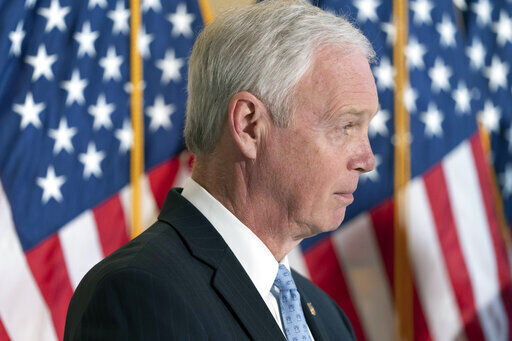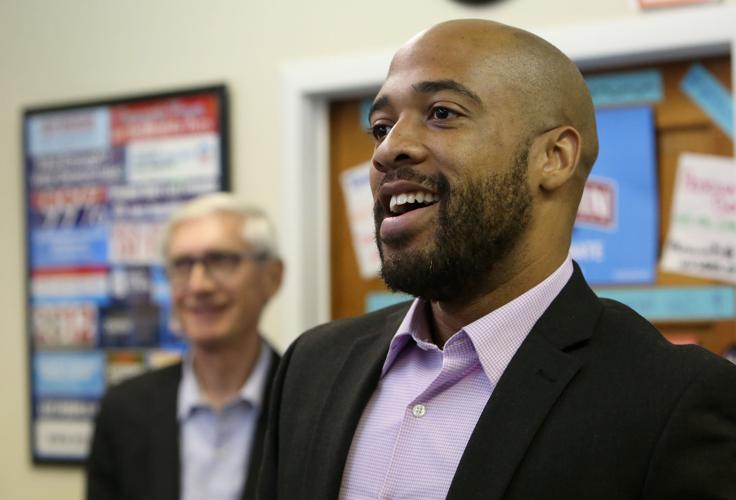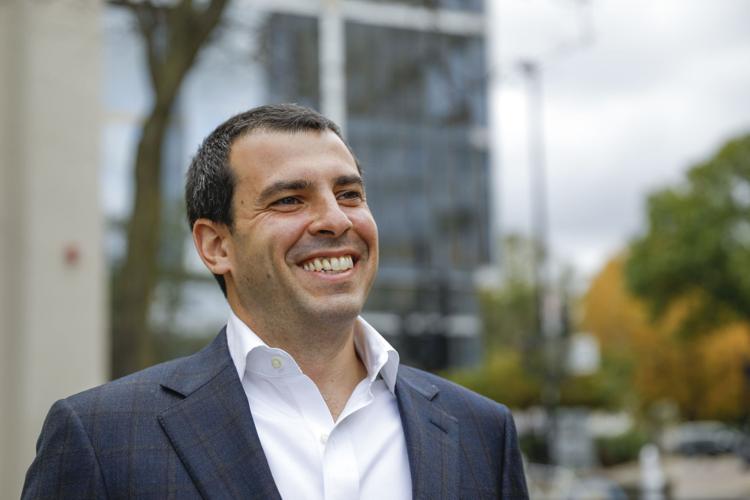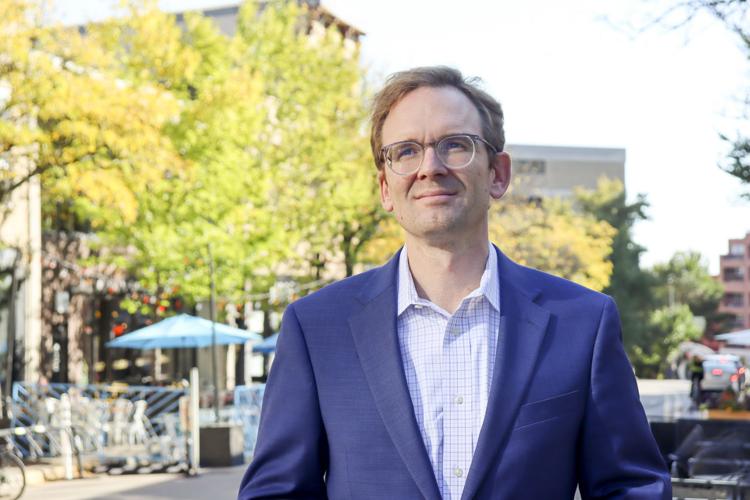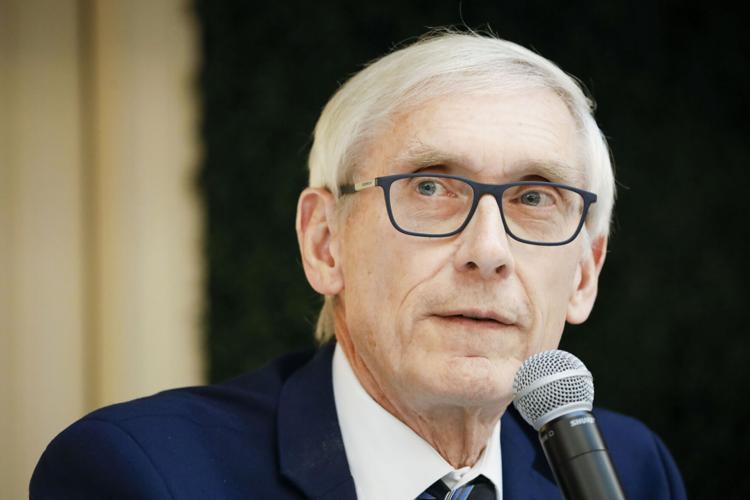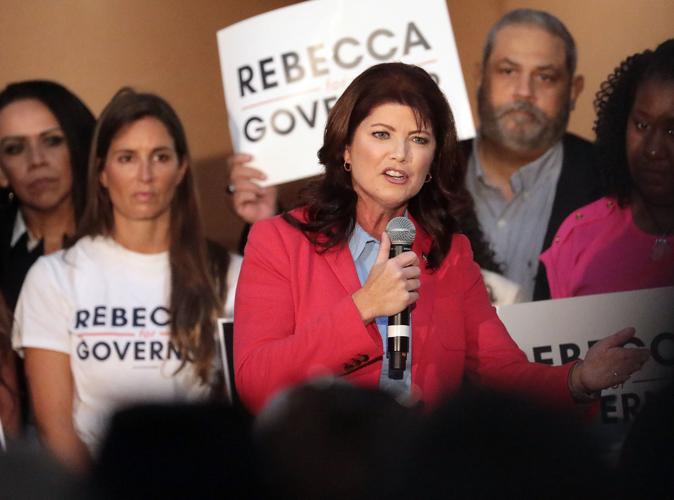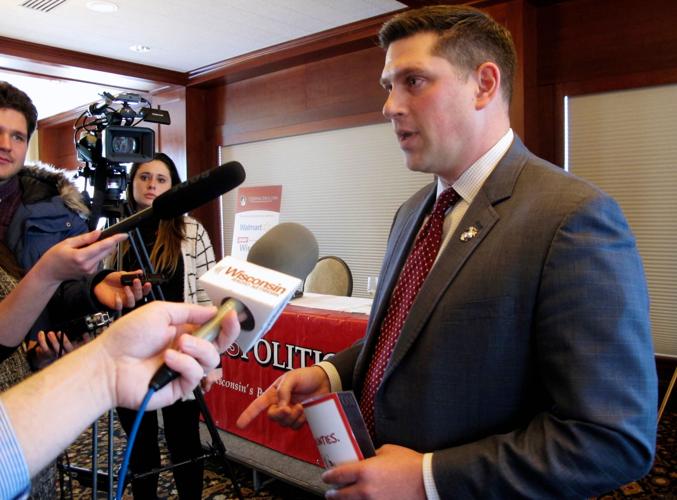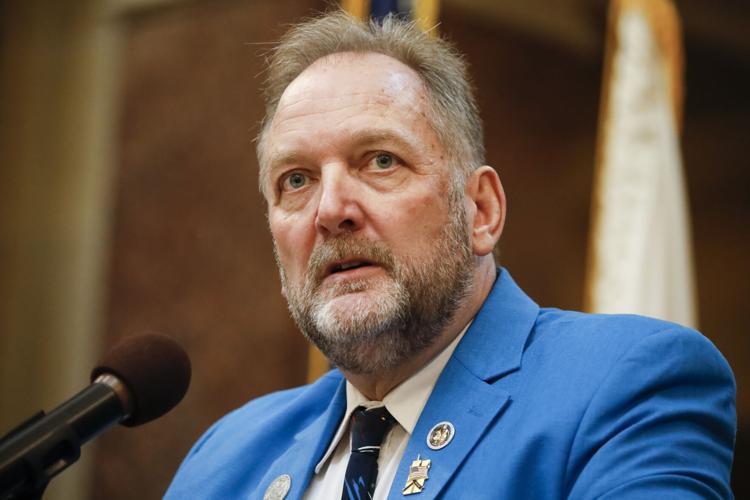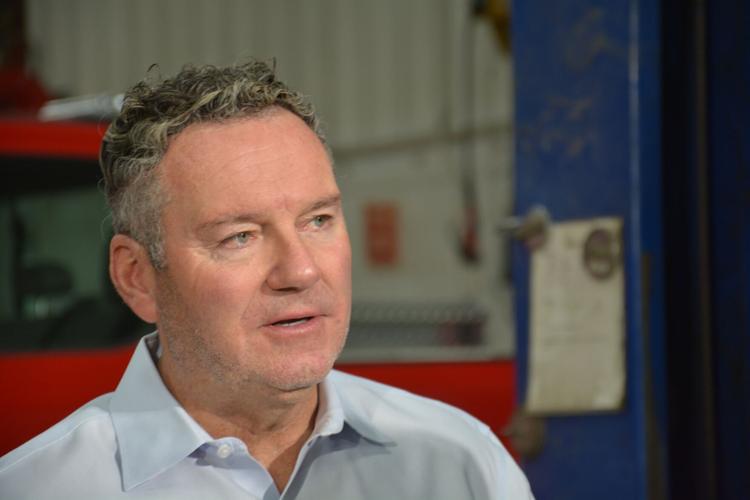The state Republican party’s decision not to endorse candidates in several statewide elections this year — a break from a long-standing practice — could give an outsized role to wealthy donors and outside groups looking to spend big on Wisconsin elections this fall.
Delegates attending the state GOP convention in Middleton last weekend declined to endorse a candidate in the state’s gubernatorial race, where a packed field of GOP hopefuls are vying to unseat Democratic Gov. Tony Evers this fall.
Critics of the endorsement process say the decision prevents establishment Republicans from hand-picking a preferred candidate months before voters have their say in the Aug. 9 primary, but it also cuts off candidates who may have otherwise received the endorsement from the state party’s cash and resources. The winner of the gubernatorial primary will go on to face Evers on Nov. 8 in a high-stakes election for both parties.
People are also reading…
“With no endorsement, it makes the outside money even more important,” said Matthew Rothschild, executive director of the Wisconsin Democracy Campaign, which tracks campaign spending. “The super PACs and the dark money groups will have an outsized impact this time around as a result of this non-endorsement.”
While the Republican Party of Wisconsin has lagged behind its Democratic counterpart in fundraising and spending totals in recent years, the party still offers considerable support to those who earn an endorsement through resources like voter lists, neighborhood teams and joint fundraising efforts.
Mark Jefferson, executive director of the Republican Party of Wisconsin, said it’s difficult to quantify the value of the state party’s endorsement on any individual campaign, but said party officials plan to align behind whomever wins the Aug. 9 primary. Party delegates also chose not to endorse in contested GOP primaries for attorney general, lieutenant governor and secretary of state.
“This will allow us to work with all candidates equally,” he said. “The voters will decide in August, and we’ll take it from there.”
Rothschild said gubernatorial candidates Rebecca Kleefisch, who served eight years as lieutenant governor under Gov. Scott Walker, and former Marine Kevin Nicholson should have no trouble raising campaign funds leading up to the primary thanks to their individual PACs and ties to some of the state’s most wealthy GOP donors.
However, increased spending by super PACs could allow outside groups and conservative billionaires like Richard and Elizabeth Uihlein and Diane Hendricks to play a bigger role in the upcoming gubernatorial race, he added. The Uihleins own Pleasant Prairie’s packaging giant Uline, while Hendricks is the co-founder of Beloit-based roofing company ABC Supply.
“The money from the super-rich Republican donors — the Uihleins, Diane Hendricks — those folks may end up having more of a say than the chairman of the Republican state party,” Rothschild said.
Megadonors boost campaigns
Richard Uihlein urged Nicholson to join the gubernatorial race in January, months after Kleefisch announced her candidacy in September. The announcement came after Elizabeth Uihlein donated $20,000 to Kleefisch’s campaign, as well as $200,000 to a political action committee supporting Kleefisch’s run for governor.
The Uihleins and Hendricks earlier this year donated a combined $3.5 million to Wisconsin Truth PAC, a new super PAC created to support the reelection campaign of Republican U.S. Sen. Ron Johnson, the Milwaukee Journal Sentinel reported. Johnson, of Oshkosh, is running unopposed in the August primary and was one of just two statewide candidates — along with state treasurer candidate Orlando Owens — to secure the state party’s endorsement last week.
Tim Michels, who joined the race for governor in April, has pledged to largely self-fund his campaign and limit individual contributions to no more than $500, though state law caps such donations at $20,000. As the millionaire co-owner of Brownsville-based Michels Corp., Michels is expected to inject millions of his own funds into his campaign.
“I’m not going to owe anyone anything,” he said last month. “I don’t give a rip about the lobbyists, the special interests, the PACs.”
State Rep. Timothy Ramthun’s unfounded claims of widespread fraud in the 2020 presidential election have netted him praise from former President Donald Trump and a collective of Republican election deniers in the state, but it remains unclear if his support has generated sizable campaign donations. Recounts, court decisions and multiple reviews affirmed that President Joe Biden defeated Trump in Wisconsin by almost 21,000 votes.
A potential endorsement from Trump also looms large over the gubernatorial race as the former president’s support could provide a major benefit in the upcoming primary.
New reports due July 15
Campaign finance reports for the first half of the year are due to the Wisconsin Ethics Commission on July 15 and will provide the first glimpse into fundraising efforts by Michels, Nicholson and Ramthun, who all joined the race earlier this year, as well as an update on Kleefisch’s progress.
Hannah Menchhoff, rapid response director for the Democratic Party of Wisconsin, described the GOP convention as “a disaster and an embarrassment for the Republican Party.”
“They failed to unite around a candidate and will now continue the slog and division for another two and a half months,” Menchhoff said.
At a news conference Friday outside the state Capitol, where he announced he was handing in his nomination signatures, Evers said Democratic voters were united to reelect him to a second term this fall and pledged to continue to “serve as a brick wall against radical Republican proposals,” including bans on abortion, relaxed firearm restrictions and more stringent voting laws.
“We’re building a strong campaign that is ready to win,” Evers said. “Democrats are unified and ready to keep the governor’s office this November.”
Former GOP strategist Brandon Scholz said he believes the state party made a “huge mistake” by not offering an endorsement in several statewide races but added he does not expect the lack of an endorsement to play a major role in the August primary.
“For a candidate to walk out of the convention and declare victory because there was no endorsement, if that’s a victory, take it and go because it really doesn’t have much to do with Republicans going after their big goal, and that is defeating Gov. Evers,” Scholz said.
Evers reported holding more than $10 million at the close of 2021, according to campaign finance reports filed in January. Kleefisch reported raising more than $3.3 million in the first four months of her campaign — 10 times more than the state Republican Party raised in the second half of last year. Both fundraising totals have been touted as record-breaking by their respective campaigns and underscore what is expected to be an expensive gubernatorial race this year.
Democrats outraising GOP
Fundraising figures are just one component of a successful campaign or political party, but they can offer a glimpse into the campaign’s or party’s organization, donor base and overall support.
Campaign finance laws written by Legislative Republicans and signed in late 2015 by Walker allow political parties to receive unlimited donations and make unlimited transfers of funds to candidates.
As was the case leading up to the 2020 presidential election, the state Democratic Party dramatically outraised the Republican Party of Wisconsin last year, with Democrats bringing in more than $2.25 million in the final five months of 2021, compared with about $322,000 raised by Republicans.
The Democratic Party raised more than $6.6 million last year, compared to less than $1.3 million raised by the Republican Party. Donations to state parties are not capped at $20,000 like they are for candidates.
Evers received more than $3.7 million from committees and PACs last year, including more than $2.2 million from the state Democratic Party.
“The Republican state party isn’t the fundraising goliath that it used to be,” Rothschild said.
Still, the Republican Party of Wisconsin has the ability to pump considerable funding and resources into campaigns. The party spent millions on Walker’s 2014 and 2018 reelection bids, though the former governor ran unopposed in primaries both years.
Ron Johnson
U.S. Sen. Ron Johnson, R-Oshkosh, has supported federal abortion bans in the past and praised the leaked Roe draft opinion but said the matter is best be handled by each state. Still, the Oshkosh Republican’s spokesperson, Alexa Henning, would not clarify whether Johnson would support a federal ban.
“The reality is there is no consensus on passing federal legislation, nor will there be without the process first playing out in the states,” she said in a statement. “The Senator has always felt that this issue is best decided by the people on a state-by-state basis.”
Johnson supported a federal 20-week abortion ban with exceptions for rape, incest or threat to the life of the mother. He also signed onto the U.S. Supreme Court brief in Dobbs v. Jackson Women’s Health Organization — the case poised to trigger the court overturning Roe — to uphold Mississippi’s 15-week abortion ban. The Mississippi law has exceptions for medical emergencies or “a severe fetal abnormality.”
“Roe v. Wade delayed a democratic resolution to the profound moral question of abortion for 50 years,” Henning said in a statement.
Mandela Barnes
Lt. Gov. Mandela Barnes, who is the Democratic U.S. Senate frontrunner according to the Marquette Law School Poll, called for nationwide abortion protections and the abolition of the filibuster to achieve that goal.
“I firmly believe in every woman’s right to make decisions about her own body,” he said in a statement. “Politicians have no right to put restrictions on that decision.”
Barnes said he would vote in favor of the Women’s Health Protection Act, the leading effort to codify the right to an abortion nationwide.
The measure would permit abortions any time before fetal viability and after viability as long as the pregnancy could pose a risk to the pregnant patient’s life or health.
Alex Lasry
Milwaukee Bucks executive-on-leave Alex Lasry also said he supports Democratic U.S. Sen. Tammy Baldwin’s Women’s Health Protection Act.
Speaking from the U.S. Supreme Court the night the majority draft opinion came out, Lasry warned such a decision would lead to an almost complete abortion ban in Wisconsin.
Polling second in the Democratic Senate primary according to the Marquette poll, Lasry said he supports the proposal that guarantees “a pregnant person’s right to access an abortion — and the right of an abortion provider to deliver these abortion services — free from medically unnecessary restrictions that interfere with a patient’s individual choice or the provider-patient relationship.”
Sarah Godlewski
State Treasurer Sarah Godlewski, the only female top-tier Senate candidate, campaigned on codifying Roe before the leaked draft opinion made national headlines.
She “opposes abortion restrictions that endanger or punish women,” Godlewski spokesperson Sarah Abel said in a statement. She has also expressed support for the Women’s Health Protection Act.
After the leak, Godlewski expressed frustration at Democrats’ fruitless attempts to codify Roe and ran an ad blasting Johnson for supporting reversing a case that guaranteed abortion protections nationwide for nearly 50 years.
“Sarah believes these personal and complicated decisions should be left to women and their doctors,” Abel said.
Tom Nelson
Outagamie County Executive Tom Nelson said he would vote to eliminate the filibuster and codify Roe if he were a U.S. senator after Politico broke the news about the leaked draft.
“A woman’s right to choose is absolute. I trust women to make their own medical decisions,” the Democratic Senate candidate said in a statement. “I have a 100% NARAL and Planned Parenthood voting record over three terms (2005-11) in the state Assembly — no one else in the field can match that.”
Saying reproductive rights were on the ballot in November, Nelson also said he favors expanding the U.S. Supreme Court. Conservative justices currently hold a 6-3 majority on the court.
After the leak, Nelson said, “The Supreme Court has shown their hand. Senator Chuck Schumer must call a special session to blow up the filibuster and codify Roe now.”
Gov. Tony Evers
Soon after the Roe leak made national headlines, Democratic Gov. Tony Evers led a coalition of 17 governors across the country calling on Congress to pass Baldwin’s Women’s Health Protection Act.
Still on the books but unenforceable since Roe, a resumption of the state ban would swamp Democratic Gov. Tony Evers’ efforts to stand as a bulwark between the Republican-controlled Legislature and a full-fledged abortion ban.
Still, he said he “will fight every day” for access to abortion and reproductive rights as long as he is governor.
Rebecca Kleefisch
Former Lt. Gov. Rebecca Kleefisch, whom the Marquette poll shows is the clear Republican frontrunner in the gubernatorial race, said she supports Wisconsin’s law that bans abortion in almost every instance except for when the mother’s life is at risk.
Asked during a Fox6 interview whether she would support additional exceptions for rape and incest, Kleefisch said she wouldn’t because she doesn’t “think it’s the baby’s fault how the baby is conceived.”
She also said she hoped and prayed for the U.S. Supreme Court to overturn Roe. In the past, Kleefisch said she would support a bill banning abortions after doctors can detect a fetal heartbeat.
Kevin Nicholson debate
Management consultant and Republican gubernatorial candidate Kevin Nicholson has called himself “100% pro-life” and said he prays Roe gets overturned.
While he once supported abortion rights, Nicholson said in a survey that he would ban abortions in all cases.
“I’m honored to be the only candidate for governor endorsed by both Pro-Life Wisconsin and Wisconsin Family Action PAC,” he said in a statement.
As governor, Nicholson said he would “(end) state funding of Planned Parenthood and (support) existing pregnancy resource centers around our state.”
Timothy Ramthun
State Rep. Tim Ramthun, R-Campbellsport, who is running for governor, also has called himself “100% pro-life.”
Ramthun and Nicholson are the only two gubernatorial candidates endorsed by Pro-Life Wisconsin, a group that opposes abortion ban exceptions for rape, incest or the life and health of the mother.
He also voted against a package of anti-abortion legislation because they contained exceptions for when abortion would be permitted.
“A child should never suffer for the sins of their mothers or fathers, and all life is sacred,” he said in a statement.





